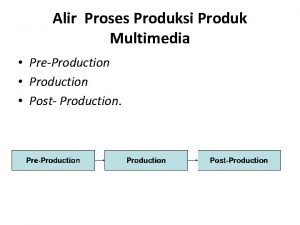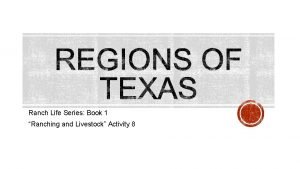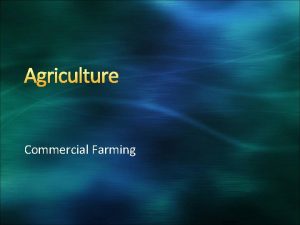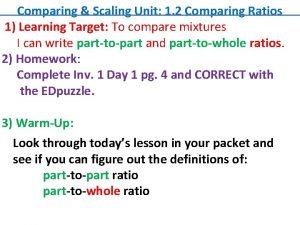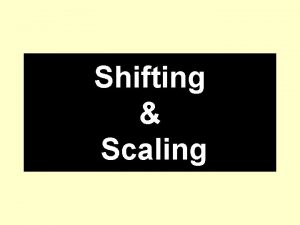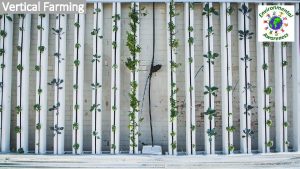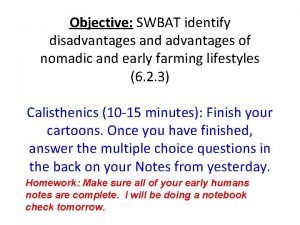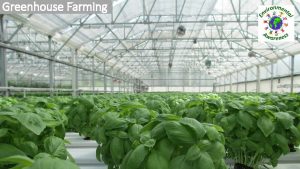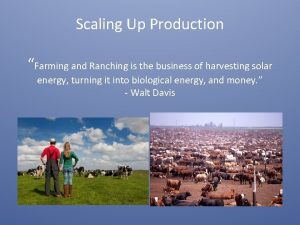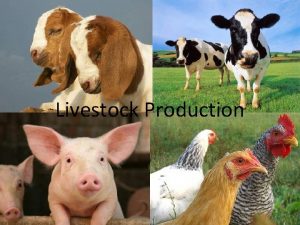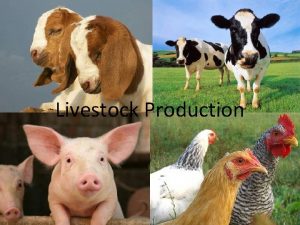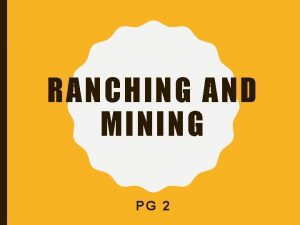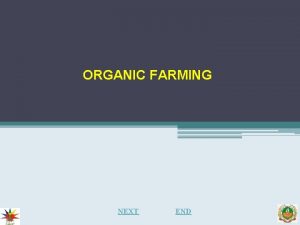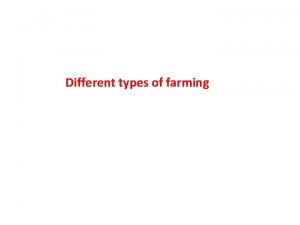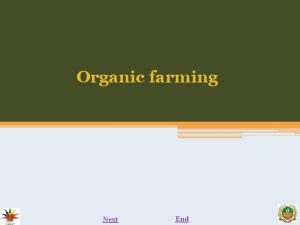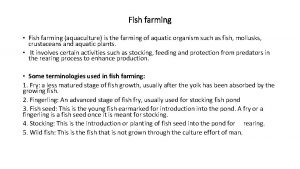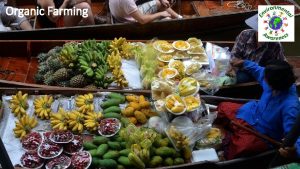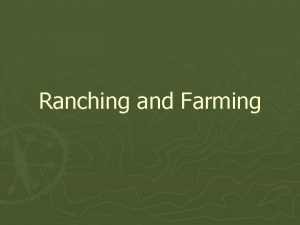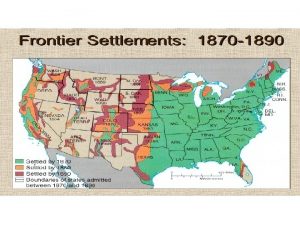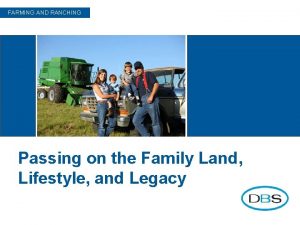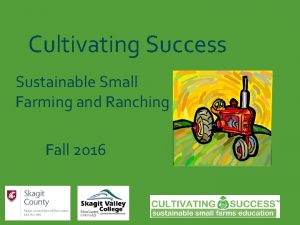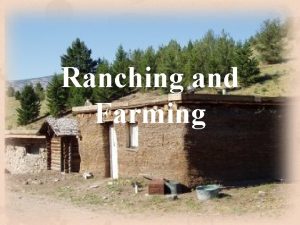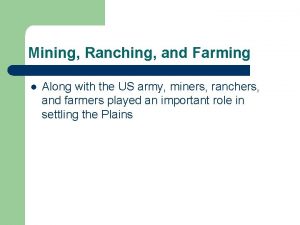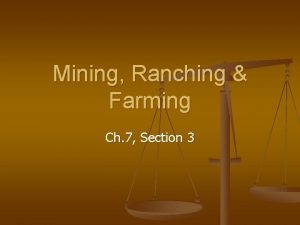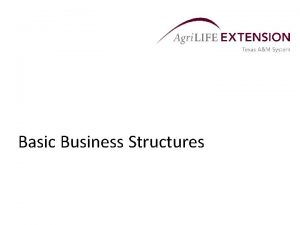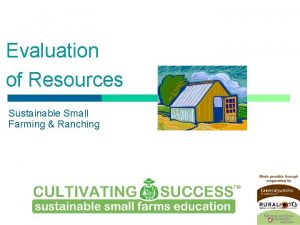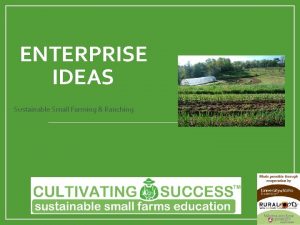Scaling Up Production Farming and Ranching is the






























- Slides: 30

Scaling Up Production “Farming and Ranching is the business of harvesting solar energy, turning it into biological energy, and money. ” - Walt Davis


Business Planning • Scaling up may necessitate a new/revised business plan

What Track are you On? • Where are you? • Where have you been? • Where are you going? – What will it take to get there? – What are the less obvious things you will have to do to get there? – Stubborn Farm & Burk BeefRecords2015 Records. xlsx

What are You Willing to Do?

Drivers of Scaling Up • Market demand • Excess resources (time and energy? ) • Not at a profitable Economy of Scale

Economies of Scale

Different Challenges than Farming

Planned Grazing

What Sector?

Cattle Production Projections • FFF cattle production. xlsx

Thanks!


Scaling up a Vegetable Operation for greater Viability and Profitability

What does it mean to “scale up”? • Greater on farm efficiencies – Crop Plan • Make a crop plan in order to adapt to unexpected changes – Field Management • Find the most efficient techniques in which to grow your crop – Post Harvest • Quick, clean, and safe post harvest handling • Better off farm efficiencies – Marketing • Securing markets before hand

Why Scale up?

Why Scale up? • Increase on farm profits – Build assets and infrastructure • Work not as hard (not less) – Let some equipment do the work for you • Most important… – Your long term physical and fiscal health

How to scale up?

How to Scale up? • Treat your farm as a business and not just a hobby or passion – Businesses grow over time. If you scale up correctly based on your on farm needs your gross income might not change, but your net and assets can increase • Make a long term farm plan (think years, not season to season) – Don’t get caught in year to year planning. Make a 3 -5 year plan that is tangible and flexible • Value your time – It is worth more than anything on your farm

SWOT Analysis

Complete a SWOT analysis of your farm • Strengths • What advantages does your farm have? • What do you do better than anyone else (crops, marketing, etc)? • What unique resources can you draw upon that others can't? • • Weaknesses • What could you improve on your farm? • What should you avoid (crops, markets, etc)? It's best to be realistic now, and face any unpleasant truths about your operations as soon as possible. • Opportunities • What good opportunities can you spot? • What interesting trends are you aware of? • • • Threats What financial, physical, and other business obstacles do you face? • What are other farms in your area doing? • Do you have bad debt or cash-flow problems? Could ANY of your weaknesses seriously threaten your business?

Scaling up for Potato Production and Tractor Purchase • Strengths • Weakness • Opportunities – Farm has the space to expand – Established markets for potatoes – Some basic tractor skills – Markets are there but I have not grown the crop in such volume – Limited resources on finding tools and tractor – Do not own a tractor! – – • There is a demand for the crop in the Durango Wholesale market Building assets for the farm and more accounts in Durango Tractor can be used for other harvests and cultivation (root crops mainly) Good financing available locally Threats – – Storage limitations Limited financial resources If tractor does not work or breaks down, labor costs will sky rocket Going into 5 years (or longer of debt)

Running the Potato Numbers: The Old Method • All field prep, planting, hilling, and harvest was done by hand • Limited planting due to high labor costs • (400# seed / 10 x 200 ft beds) – Prep: tillage and shaping : • 30 hours in labor for prep - $30 / bed ($300 total) – Planting: seeding and covering by hand: • 20 hours in labor - $20 / bed ($200) – Hilling: shoveling dirt: • 20 hours of labor - $20 / bed ($200 total) – This might need to happen twice – Harvest: digging fork: • 4 people x 2 days x 8 hr days ($640 minimum) – Total cost of production: $1340 (at minimum) – Total Yield: 3200 lbs @ $1. 50 – $4, 800 gross estimated and ~$3, 460 net estimated

The New Method • All field prep, planting, hilling, and harvest is done with the tractor • Same size planting (400# seed / 10 x 200 ft beds) – Prep: tillage and shaping • 2 hours in labor ($20) and $10 in fuel ($30) – Planting: seeding and covering • 2 people at 5 hrs each ($100) and $10 in fuel ($110) – Hilling: with hilling discs and tractor • 2 hours of labor and $10 in fuel ($30) – Harvest: middle buster • 4 people, 1 day, 8 hour day plus fuel ($10) ( $330) Total cost of production: $500 (at minimum) – Total Yield: ~3, 200 lbs @ $1. 50 – $4, 800 gross estimated and $4, 300 net estimated

How does this all shake out? • Note: seed cost and irrigation remain constant • Old Method: • Margin is good in the low 70% • Physical stress is high • Labor and time are high • New Method: • Margin is better at almost 90% • Less physical stress • Less labor in the field per pound harvested • Your gross does not change, but you increase your net income on this crop by $800+ with the same amount planted…

So do I scale up?

Tractor and tool purchase • 1964 Farmall 140 - $4000 – Purchased at auction – For purpose of example lets say financed for 5 years ($240 quarterly payments totaling $960/yr) – American Ag Credit is amazing! • Hilling discs - $160 shipped – Buckeye tractor in Ohio • Middle buster - $120 shipped – Stevens Tractor in Louisiana • Tool bar - $200 (bought locally) – Any tractor supply company has these in stock • Total of $480 up front and $4, 000 in financing

Long term Vision for Scaling up • Debt can be scary! – If your business plan is good, marketing is locked in and you know how and what to grow well then it does not have to be – There is truth to the saying “You have to spend money to make money”! • First year or two: – Your profits from potatoes can go to the tractor purchase. • Some additional funds may be needed to cover margins. • Year 2 and into the future – Ability to grow more potatoes and gross more income (maintaining that higher margin) • Pay off tractor faster! • Invest in other infrastructure (wash station, cold storage, etc) • In the end you can make higher margins on different crops and also own assets that are worth a lot to your business financially and your body physically • Your net income is what matters at the end of the year!

Examples of scaling up from Mountain Roots Produce • Planet Jr Push Seeder – Investment of $600 – Save time from hand seeding – More precise rows • Easier weeding and water management • More controlled harvest – Time and seed savings • Less seed waste • Less time spent thinning – Saved time, seeds, and labor • Paid off in 2 years • Retain an asset that will not loose value if maintained

What are your next Steps? • Do a SWOT Analysis for your farm, yourself, and for a specific crop you grow well. • Talk to other growers and visit farms. We are all at different stages of growth and can learn a lot form each other!
 Pre dan post production adalah
Pre dan post production adalah Books on ranch life and ranching
Books on ranch life and ranching Mining and ranching lesson 2
Mining and ranching lesson 2 Sea ranching
Sea ranching Truck farming definition ap human geography
Truck farming definition ap human geography How did the spanish influence ranching in texas
How did the spanish influence ranching in texas Which use of western land negatively affected everyone?
Which use of western land negatively affected everyone? Cattle ranching
Cattle ranching Von thunen model ap human geography
Von thunen model ap human geography How did mexicanos contribute to mining in the southwest?
How did mexicanos contribute to mining in the southwest? Commercial agriculture definition
Commercial agriculture definition Compare and contrast sharecropping and tenant farming
Compare and contrast sharecropping and tenant farming Scales of measurement
Scales of measurement Manoj kuamr
Manoj kuamr Primary scales of measurement
Primary scales of measurement What is comparative scale
What is comparative scale Shifting and scaling of signals
Shifting and scaling of signals Ratio scale
Ratio scale Scaling up and down
Scaling up and down Shifting and scaling functions
Shifting and scaling functions Comparing and scaling unit test
Comparing and scaling unit test Shifting and scaling functions
Shifting and scaling functions Classification of periodontal instruments
Classification of periodontal instruments Vertical farming pros and cons
Vertical farming pros and cons Organic farming pros and cons
Organic farming pros and cons Farming mining and fishing are
Farming mining and fishing are Advantages and disadvantages of nomad life
Advantages and disadvantages of nomad life Advantages of greenhouse farming
Advantages of greenhouse farming Sharecropping and tenant farming venn diagram
Sharecropping and tenant farming venn diagram Sharecropping and tenant farming venn diagram
Sharecropping and tenant farming venn diagram Sharecropping and tenant farming venn diagram
Sharecropping and tenant farming venn diagram
